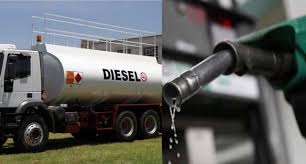.We’ve not received supply– Oil marketers
.As Gov Fubara hails Senate’s efforts at making refineries work
CHIGOZIE AMADI
The price of Automotive Gas Oil (AGO), also known as diesel, still sells at between N1300 and 1,450 naira per litre across the country despite a recent price reduction to N1000 per litre of the product announced recently by the Dangote Petroleum Refinery.
Recall that oil marketers who demanded a lower price recently also, had their request heeded when Dangote announced a slash in diesel price by 30% first, from the previous market price of ₦1,600 per litre to ₦1,200 three weeks ago, before finally pegging the price at N1000 last week.
The significant reduction in the price of diesel, by Dangote Petroleum Refinery, is expected to positively affect all spheres of the economy and ultimately reduce the high inflation rate in the country.
But investigation by our correspondents in Lagos, Osogbo and the Federal Capital Territory, FCT, Abuja revealed that the impact of the announced price change has yet to be felt for what the oil marketers said is the non-supply of diesel from the Dangote Petroleum Refinery.
For instance, the impact of the reduction has not been felt in Lagos and Osogbo, capital of Osun State as marketers attributed this to the fact that they are yet to receive supplies from the Dangote Refinery, noting that they still have the imported product in stock being sold at the old price.
A litre of diesel cost N1300 per litre and above at most Lagos filling stations.
Also, the price change has not reflected in Abuja as the price of diesel remains unchanged at N1,450 per litre even as oil marketers attributed this to the fact that they are yet to receive supplies from the Dangote Refinery, forcing them to continue selling the imported product at the old price.
The persistent high cost of diesel has had a negative effect on the market, with prices of goods and services remaining very high. Transportation costs, in particular, have severely impacted the cost of goods much to the dismay of consumers.
According to Usman Yakubu, a dealer at a local filling station in Abuja, “most filling stations are empty because people are not coming to buy as expected. This is a clear indication of the economic strain caused by the high cost of diesel.
Also, Olamide Balogun, a businessman, lamented that “the high cost of diesel has affected the prices of goods and services in the market by increasing it. The price of raw materials has gone up, thereby increasing the price of goods. Most manufacturers use generators to produce, and the high cost of diesel is taking a toll on their businesses.”
Recall that the Dangote Petroleum Refinery recently commenced the distribution of diesel and aviation jet fuel to oil marketers, marking a significant development in Nigeria’s petroleum sector.
This milestone is particularly notable as the refinery began to fulfill its role in supplying the domestic market with crucial petroleum products, in most parts of the country, but obviously, not in Abuja.
Meanwhile, despite appreciation of the naira against the United States dollar in recent days, the effect has not significantly reflected in the prices of goods and services. Traders and manufacturers continue to sell at the old prices, leaving consumers to bear the brunt of the high cost of diesel.
The situation has raised doubts about the effectiveness of the naira appreciation in forcing down the cost of goods and services.
In a related development, the impact of the price change has yet to be felt in Osogbo, as marketers attribute this to the fact that they are yet to receive supplies from the Dangote Refinery, adding that they still have the imported product in stock which they are selling at the old price.
Meanwhile, business owners, despite the massive appreciation of the naira in the exchange market, still identify transportation as one of the reasons why food and commodity prices are not experiencing any significant decrease.
Speaking with Daily Champion on Sunday, a food and provisions store owner in Osogbo, simply identified as Iya Ope, said most people don’t know that naira depreciation is not the only reason why the price of commodities skyrocketed, stressing that people don’t consider transportation cost and cost of production.
She said, “It’s funny when customers come around to buy goods, and when told the prices, the next thing you hear is, “Why? Naira is coming down.” Yes, the Naira is appreciating, but the cost of production is not coming down. Most manufacturers use diesel or petrol to power generators.
“Let us not forget the fact that they use fuel to power the vehicles they use in sending these goods to us, and that is if we are way billing and if we are to go there ourselves, the cost of transport is nothing to write home about.”
Fubara hails Senate’s efforts at making refineries work
Meanwhile, Rivers State Governor, Sir Siminalayi Fubara, has commended the efforts of the 10th Nigerian Senate to working with the President Bola Tinubu-led federal government in ensuring that refineries in the country are fixed for use and for the betterment of the citizens and the country.
Fubara made the commendation when members of the Senate Ad-Hoc Committee to Investigate the Turnaround Maintenance of Nigeria’s Refineries, led by its Chairman, Senator Ifeanyi Ubah paid him a courtesy visit at Government House in Port Harcourt over the weekend.
He said, his administration is working in tandem with the Tinubu-led government’s policies designed to make life better for Nigerians through the Renewed Hope Agenda, by working to ease loss of man-hour and unnecessary stress to the Port Harcourt refinery.
He stated that, in doing so, the Rivers State Government under his leadership, commenced the construction of Woji-Aleto-Alesa-Refinery Road, which is already 70 percent completed. “The road was being constructed to provide a bypass to easily access the Port Harcourt Refinery and take off traffic from the East-West Road”, he added.
Noting that both the federal government and host Rivers State will benefit when the refinery is finally revamped and becomes operational, he posited that the purpose of governance was to make life easy for the people, and expressed delight that the Senate Committee’s investigation would result in making life easy and meaningful for Nigerians.
He said; “We, as a State, before the commencement of the rehabilitation job, we had a contribution that we wanted to make to support the work at the refinery because of the deplorable state of the East-West Road.
“There is a road: Woji-Aleto-Alesa Refinery Road. We are almost completing the bridge. It’s about 70 percent completed. We are doing almost the last part of it. With that road, it will help to decongest and reduce the trouble commuters face along the East-West Road while providing easy access, straight to the refinery.
“So, you can see that our Government is working in line, supporting the administration of President Bola Tinubu to give our people hope and assurance that things will soon get better.
“And it is this role that you are playing, genuinely. And with the support of this State Government, that is the only way we can achieve the purpose of governance for everyone.
“When the refinery restarts production, there will be petroleum products available locally. The issue of importation will go down. We will now make impact, economy will grow, internally generated revenue will increase. More projects will be executed in this State. You can see that it’s a chain effect thing. So, I want to thank you”, he added.
Fubara reiterated that despite the political issues in the state, his government remains focused and committed on providing good governance and prioritsing the interest of the people.
“Our eyes are on the ball to deliver for our people. Even in the face of this deliberate distraction, we will not fail our people because at the end, it is the impact we make on our people that counts.”
In his presentation, the Chairman of the Senate Ad-Hoc Committee to Investigate the Turnaround Maintenance of Nigeria’s refineries, Senator Ifeanyi Ubah (representing Anambra South Senatorial District), said they were at Warri Refinery on Thursday, and had come to Port Harcourt to investigate the work that has been done and assess the level of preparedness of both the old and new Port Harcourt Refinery to recommence operations.
Senator Ubah said, “We will recall that the old Port Harcourt Refinery was the first refinery in Nigeria built in 1965, and the second one was built in 1989. And for so long now, they have not been in active operations.
“And with the Renewed Hope Agenda of Mr. President, and also the desire of Nigerians and our determination; the Senate led by our President, Senator Godswill Akpabio, we had a resolution in the Senate to look at it and make sure that Nigeria’s refineries are working so that we shouldn’t be depending on importation of petroleum products”, he said.
“We are pleased to note that what we saw is most encouraging as the refinery upgrade and full rehabilitation is almost at 90 percent completed. We are confident that the refinery will soon be operational before the end of the year,”.























